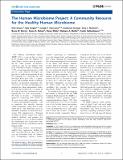| dc.contributor.author | Gevers, Dirk | |
| dc.date.accessioned | 2013-02-27T19:32:46Z | |
| dc.date.available | 2013-02-27T19:32:46Z | |
| dc.date.issued | 2012-08 | |
| dc.identifier.issn | 1544-9173 | |
| dc.identifier.issn | 1945-7885 | |
| dc.identifier.uri | http://hdl.handle.net/1721.1/77220 | |
| dc.description.abstract | The Human Microbiome Project (HMP) [1],[2] is a concept that was long in the making. After the Human Genome Project, interest grew in sequencing the “other genome" of microbes carried in and on the human body [3],[4]. Microbial ecologists, realizing that >99% of environmental microbes could not be easily cultured, developed approaches to study microorganisms in situ [5], primarily by sequencing the 16S ribosomal RNA gene (16S) as a phylogenetic and taxonomic marker to identify members of microbial communities [6]. The need to develop corresponding new methods for culture-independent studies [7],[8] in turn precipitated a sea change in the study of microbes and human health, inspiring the new term “metagenomics" [9] both to describe a technological approach—sequencing and analysis of the genes from whole communities rather than from individual genomes—and to emphasize that microbes function within communities rather than as individual species. This shift from a focus on individual organisms to microbial interactions [10] culminated in a National Academy of Science report [11], which outlined challenges and promises for metagenomics as a way of understanding the foundational role of microbial communities both in the environment and in human health. | en_US |
| dc.description.sponsorship | National Institutes of Health (U.S.) (grant U54HG004969) | en_US |
| dc.description.sponsorship | National Institutes of Health (U.S.) (grant U54HG004973) | en_US |
| dc.description.sponsorship | National Institutes of Health (U.S.) (grant U54AI084844) | en_US |
| dc.description.sponsorship | National Institutes of Health (U.S.) (grant U01HG004866) | en_US |
| dc.description.sponsorship | National Institutes of Health (U.S.) (grant R01HG005969) | en_US |
| dc.description.sponsorship | National Institutes of Health (U.S.) (grant R01HG004872) | en_US |
| dc.description.sponsorship | United States. Army Research Office (grant W911NF-11-1-0473) | en_US |
| dc.description.sponsorship | National Science Foundation (U.S.) (NSF DBI-1053486) | en_US |
| dc.description.sponsorship | Howard Hughes Medical Institute (Early Career Scientist) | en_US |
| dc.language.iso | en_US | |
| dc.publisher | Public Library of Science | en_US |
| dc.relation.isversionof | http://dx.doi.org/10.1371/journal.pbio.1001377 | en_US |
| dc.rights | Creative Commons Attribution | en_US |
| dc.rights.uri | http://creativecommons.org/licenses/by/2.5/ | en_US |
| dc.source | PLoS | en_US |
| dc.title | The Human Microbiome Project: A Community Resource for the Healthy Human Microbiome | en_US |
| dc.type | Article | en_US |
| dc.identifier.citation | Gevers, Dirk et al. “The Human Microbiome Project: A Community Resource for the Healthy Human Microbiome.” PLoS Biology 10.8 (2012): e1001377. CrossRef. Web. | en_US |
| dc.contributor.department | Massachusetts Institute of Technology. Department of Civil and Environmental Engineering | en_US |
| dc.contributor.mitauthor | Gevers, Dirk | |
| dc.relation.journal | PLoS Biology | en_US |
| dc.eprint.version | Final published version | en_US |
| dc.type.uri | http://purl.org/eprint/type/JournalArticle | en_US |
| eprint.status | http://purl.org/eprint/status/PeerReviewed | en_US |
| dspace.orderedauthors | Gevers, Dirk; Knight, Rob; Petrosino, Joseph F.; Huang, Katherine; McGuire, Amy L.; Birren, Bruce W.; Nelson, Karen E.; White, Owen; Methé, Barbara A.; Huttenhower, Curtis | en |
| mit.license | PUBLISHER_CC | en_US |
| mit.metadata.status | Complete | |
